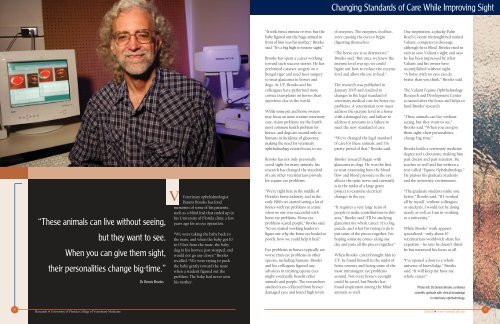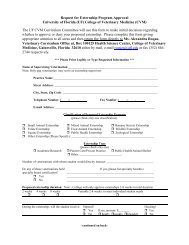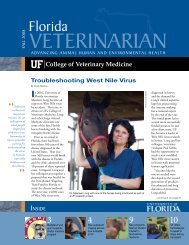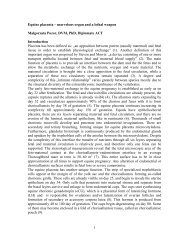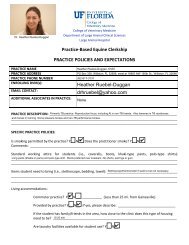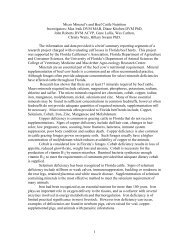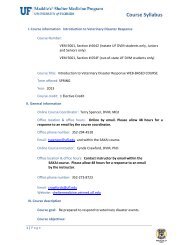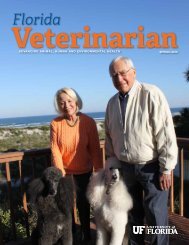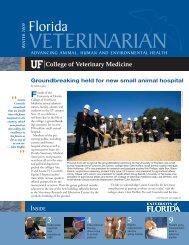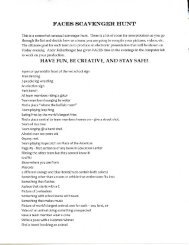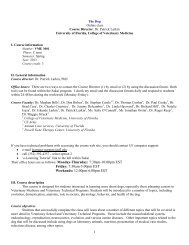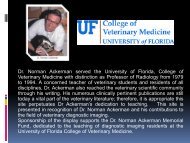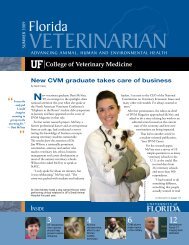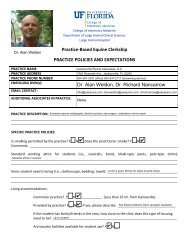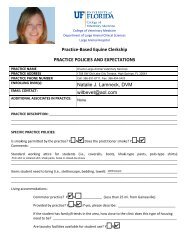Charting New Territory With Immunodeficiency Virus <strong>Research</strong>Could cats,rather than dogs,be man’s best friend?When it comesto AIDS research,the answer might be yes.UUniversity <strong>of</strong> Floridaimmunologist Janet Yamamotosays the feline immunodeficiencyvirus, or FIV, has biologicalsimilarities to humanimmunodeficiency virus, or HIV,and those similarities could yieldadvances in efforts to develop anHIV vaccine.Yamamoto says she has “alwaysliked viruses.” In the early 1980s, sheworked on the virus that causesfeline leukemia and in 1986, she anda colleague discovered FIV, the virusthat causes AIDS in cats. Her workduring the 1990s culminated in anFIV vaccine that becamecommercially available in 2002.Yamamoto found her work on FIV<strong>of</strong>ten intersected with research onHIV. There are points in thestructures <strong>of</strong> both viruses, in fact,where the two are so similar thatresearch into one virus may help inresearch into the other.“We are working on a newgeneration <strong>of</strong> feline vaccines thatactually are made with HIVproteins,” said Yamamoto, whodirects the Laboratory <strong>of</strong>Comparative Immunology andRetrovirology at UF’s <strong>College</strong> <strong>of</strong><strong>Veterinary</strong> <strong>Medicine</strong>. “We’ve foundthat HIV proteins are closely relatedto FIV proteins and are useful indeveloping an FIV vaccine, so thatleads us to ask whether FIV proteinscan help humans.”Immunodeficiency viruses have “agood side and a bad side,”Yamamoto said. People are familiarwith the bad, which leads to AIDS, adisease that has killed 22 millionpeople worldwide since it wasidentified in 1981, according toUnited Nations estimates.Yamamoto said the virus likes tohide its “good” side, which providesprotection against disease, making itvery difficult to isolate it. But inpeople – and cats – who have animmunodeficiency virus for yearswithout getting ill, the virus’ goodside is at work. These people andcats are called long-termnonprogressors and the strains theycarry may provide a key toprevention, therapy or even a curefor the disease.The work is painstaking. Imaginethat FIV and HIV are long ribbons.One section <strong>of</strong> the ribbon maycontain elements that cause diseaseor accelerate it. But the flip side <strong>of</strong>that section <strong>of</strong> ribbon may be “good”and hold elements that provideprotection against disease or retardthe disease. Then imagine five FIVribbons and two HIV ribbons.<strong>Research</strong>ers have found five distinctsubtypes <strong>of</strong> FIV, each with its owncharacteristics that had to beunderstood and studied beforemoving forward on a vaccine. Theprotective properties in thesubtypes had to be combined innumerous ways to bring out themost protective combination whilesuppressing the harmful properties.“We were about to give up on anFIV vaccine when we combinedsubtype A and subtype D,”Yamamoto said. “The overlap <strong>of</strong>those two gave us the protection wewere seeking.”Cats can’t get HIV infection, soYamamoto now is researching waysto use the protective elements <strong>of</strong>HIV in a feline vaccine. Her researchfound a protective section <strong>of</strong> HIVthat provides better immunity forcats than the protective sections <strong>of</strong>FIV. This section <strong>of</strong> HIV is sosimilar to FIV that it is usable in afeline vaccine. And since cats can’tget infected with HIV, the HIVproteins that promote disease inhumans do nothing to cats.Since the reverse is also true –humans can’t get FIV – she wouldlike to continue her work by lookingfor FIV strands that trigger animmune response in humanswithout promoting the disease.“It was important to find out thatHIV proteins are so closely relatedto FIV proteins,” Yamamoto said.“Hopefully, I can contribute to thehuman vaccine with my model.”Selecting the right strains to triggerimmunity in cats is much easier thandoing so with humans. AsYamamoto said, “In cats, we couldimmunize and watch. But there areno laboratory humans.”Yamamoto believes that tests withpeople who already have HIV wouldshow whether a vaccine developedfrom FIV could be useful as therapyand perhaps eventually useful in ahuman vaccine.“We have identified, so far, threeregions <strong>of</strong> FIV that are similar toHIV-1, and these FIV regionscould be tested with immune cellsfrom people who have HIV,”Yamamoto said. “If these regionsare recognized by the immune cellsfrom people with HIV, it wouldsuggest that those regions may beuseful as components for HIVvaccines for non-infected humans.However, more studies are needednot only in cats but also in monkeysto determine the significance <strong>of</strong>these FIV regions as componentsfor HIV vaccines.”Yamamoto spent much <strong>of</strong> 2004 andwill spend more time in 2005collaborating with colleagues at theUniversity <strong>of</strong> California at SanFrancisco and the University <strong>of</strong>Pittsburgh, as part <strong>of</strong> her strongbelief that teamwork will be the keyto further breakthroughs onimmunodeficiency viruses. Hervaccine work has been funded withmore than $3.4 million in grantsfrom the National Institutes <strong>of</strong>Health since 1989. She also hasfunded her research with more than$1 million in royalties from herpatents, including the patent on theFel-O-Vax FIV, which is marketedby Fort Dodge Animal Health, adivision <strong>of</strong> Wyeth pharmaceuticals.Yamamoto said she uses her patentmoney to explore ideas. When anidea bears fruit, she seeks grants.“NIH funding is taxpayer money, sowe need to repay it with discovery.”She personally repays some <strong>of</strong>her laboratory cats, veterans <strong>of</strong>bone marrow transplants, byproviding a home for them. But shewould like to see her feline studiespay <strong>of</strong>f for people.“Seeing animals and people livelonger, that’s why we do this work,”Yamamoto said. “I enjoy seeing myconcept and products help. It’sapplied research. I believe the catscan benefit not only cats, butpeople, too.”Photo left: Dr. Janet Yamamoto’s work on FIV<strong>of</strong>ten intersects with research on HIV.18<strong>Research</strong> • University <strong>of</strong> Florida <strong>College</strong> <strong>of</strong> <strong>Veterinary</strong> <strong>Medicine</strong>••Infectious Diseases • www.vetmed.ufl.edu19
Changing Standards <strong>of</strong> Care While Improving Sight“These animals can live without seeing,but they want to see.When you can give them sight,their personalities change big-time.”Dr. Dennis BrooksV<strong>Veterinary</strong> ophthalmologistDennis Brooks has fondmemories <strong>of</strong> some <strong>of</strong> his patients,such as a blind foal that ended up inhis University <strong>of</strong> Florida clinic a fewyears ago for an eye operation.“We were taking the baby back tothe mare, and when the baby got 10to 15 feet from the mare, the babydug in his hooves, just stopped, andwould not go any closer,” Brooksrecalled. “We were trying to pushthe baby gently toward the marewhen a student figured out theproblem. The baby had never seenhis mother.“It took him a minute or two, but thebaby figured out the huge animal infront <strong>of</strong> him was his mother,” Brookssaid. “It’s a big high to restore sight.”Brooks has spent a career workingtoward such success stories. He hasperformed cataract surgery on aBengal tiger and used laser surgeryto treat glaucoma in horses anddogs. At UF, Brooks and hiscolleagues have performed morecornea transplants on horses thananywhere else in the world.While some pet and horse ownersmay focus on more routine veterinarycare, vision problems are the fourthmost common health problem forhorses, and dogs are second only tohumans in incidence <strong>of</strong> glaucoma,making the need for veterinaryophthalmology research easy to see.Brooks has not only personallysaved sight for many animals, hisresearch has changed the standard<strong>of</strong> care other veterinarians providefor equine eye problems.“We’re right here in the middle <strong>of</strong>Florida’s horse industry, and in theearly 1980s we started seeing a lot <strong>of</strong>horses with eye problems at a timewhen no one was successful withhorse eye problems. Horse eyeproblems scared people,” Brooks said.“So we started working harder t<strong>of</strong>igure out why the horse eye healed sopoorly, how we could help it heal.”Eye problems in horses typically areworse than eye problems in otherspecies, including humans. Brooksand his colleagues figured anyadvances in treating equine eyesmight eventually benefit otheranimals and people. The researchersstudied tears collected from horses’damaged eyes and found high levels<strong>of</strong> enzymes. The enzymes, in effect,were causing the eyes to begindigesting themselves.“The horse eye is so destructive,”Brooks said. “But once we knew theenzyme level was up, we couldfigure out how to reduce the enzymelevel and allow the eye to heal.”The research was published inJanuary 2005 and resulted inchanges in the legal standard <strong>of</strong>veterinary medical care for horse eyeproblems. A veterinarian now mustaddress the enzyme level in a horsewith a damaged eye, and failure toaddress it amounts to a failure tomeet the new standard <strong>of</strong> care.“We’ve changed the legal standard<strong>of</strong> care for these animals, and I’mpretty proud <strong>of</strong> that,” Brooks said.Brooks’ research began withglaucoma in dogs. He was the firstto start examining how the bloodflow and blood pressure in the eyeaffects the optic nerve and currentlyis in the midst <strong>of</strong> a large grantproject to examine electricalchanges in the eye.“It requires a very large team <strong>of</strong>people to make contributions in thisarea,” Brooks said. “I’ll be studyingglaucoma my whole career. It’s a bigpuzzle, and what I’m trying to do isput some <strong>of</strong> the pieces together. I’mhoping someone comes along oneday and puts all the pieces together.”When Brooks’ career brought him toUF, he found himself in the midst <strong>of</strong>horse country and facing some <strong>of</strong> themost intransigent eye problemsaround. Not every horse’s eyesightcould be saved, but Brooks hasfound inspiration among the blindanimals as well.One inspiration, a plucky PalmBeach County thoroughbred namedValiant, competes in dressagealthough he is blind. Brooks tried invain to save Valiant’s sight and sayshe has been impressed by whatValiant and his owner haveaccomplished without sight.“A horse with no eyes can dobetter than you think,” Brooks said.The Valiant Equine Ophthalmology<strong>Research</strong> and Development Centeris named after the horse and helps t<strong>of</strong>und Brooks’ research.“These animals can live withoutseeing, but they want to see,”Brooks said. “When you can givethem sight, their personalitieschange big-time.”Brooks holds a veterinary medicinedegree and a doctorate, making himpart doctor and part scientist. Heteaches as well and has written atext called “Equine Ophthalmology.”He praises his graduate studentsand the university environment.“The graduate students make youbetter,” Brooks said. “If I workedall by myself, without colleaguesor students, I would not be doingnearly as well as I am in workingat a university.”While Brooks’ work appearsspecialized – only about 10veterinarians worldwide share hisexpertise – he says he doesn’t thinkhe has narrowed his focus at all.“I’ve opened a door to a wholeuniverse <strong>of</strong> knowledge,” Brookssaid. “It will keep me busy mywhole career.”Photo left: Dr. Dennis Brooks combinesscientific aptitude with clinical knowledgein veterinary ophthalmology.20<strong>Research</strong> • University <strong>of</strong> Florida <strong>College</strong> <strong>of</strong> <strong>Veterinary</strong> <strong>Medicine</strong>••Clincal • www.vetmed.ufl.edu21


